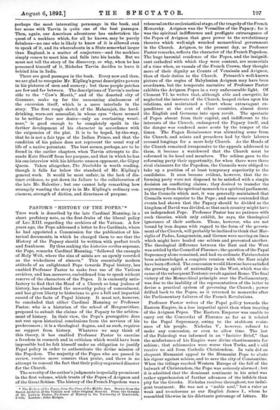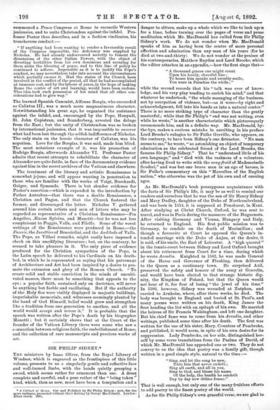PASTOR'S "HISTORY OF THE POPES."*
Tars work is described by the late Cardinal Manning, in a short prefatory note, as the first-fruits of the liberal policy of Leo XIII. regarding the archives of the Vatican. A few years ago, the Pope addressed a letter to five Cardinals, whom he had appointed a Commission for the publication of his- torical documents, in which he charged them to see that the History of the Papacy should be written with perfect truth and frankness. By thus making the historica veritas supreme, the Pope, remarks Cardinal Manning, "followed the example of Holy Writ, where the sins of saints are as openly recorded as the wickedness of sinners." This essentially modern attitude of an enlightened Pope towards Papal history, has enabled Professor Pastor to make free use of the Vatican archives, and has, moreover, emboldened him to speak without reserve of the characters of the Popes. It is eminently satis- factory to find that the Head of a Church so long jealous of history, has abandoned the unworthy policy of concealment, and has given liberty to historians to give a full and impartial record of the facts of Papal history. It must not, however, be concluded that either Cardinal Manning or Professor Pastor, who is a historian of the school of Hergenriither, proposed to submit the claims of the Papacy to the arbitra- ment of history. In their view, the Pope's prerogative does not rest upon historical conclusions from the services of his predecessors ; it is a theological dogma, and as such, requires no support from history. Whatever we may think of this theory, it has enabled Professor Pastor to exercise a freedom in research and in criticism which would have been impossible had he felt himself under an obligation to justify Papal policy in order to authenticate the divine mission of the Popedom. The majority of the Popes who are passed in review, receive more censure than praise, and there is no attempt to conceal the fact that their policy organised disaster for the Church.
The severity of the author's judgments is specially prominent in the first volume, which treats of the Popes of Avignon and of the Great Schism. The history of the French Popedom was a
* The II iaorg of the Popes, front the Close of the Middle Ages. Drawn from the Secret Archives of the Vatican and other Original Sources. From the German of Dr. Ludwig Pastor, Professor of History in the University of Innsbrack. 2 vols. London: John Hodges.
rehearsal on the ecclesiastical stage, of the tragedy of the French Monarchy. Avignon was the Versailles of the Papacy; for it was the spiritual indifference and profligate extravagance of the Popes of Avignon that gave power to the revolutionary theories which well-nigh wrecked monarchical government in the Church. Avignon, to the present day, as Professor Pastor remarks, reflects the character of the French Popedom. The huge baronial residence of the Popes, and the insignifi- cant cathedral with which they were content, are memorials of a time when, as vassals of the French Crown, they thought more of their dignity as Counts of Venaissin and Avignon, than of their duties to the Church. Petrarch's well-known picture of the orgies of Babylonian Avignon may have been overdrawn, but the temperate narrative of Professor Pastor exhibits the Avignon Popes in a very unfavourable light. Of Clement VI. he writes that, although able and energetic, he neglected the interests of the Church, heaped riches upon his relations, and maintained a Court whose extravagant ex- penditure at the cost of other countries, almost drove the English and Germans into open revolt. The spectacle of Popes absent from their capital, and indifferent to the interests of the Church, endangered the Papacy itself, and the danger was rendered more acute by the temper of the times. The Pagan Renaissance was alienating some from the Church, and saints and preachers had by their labours aroused longings for a more holy Church. As the Heads of the Church remained irresponsive to the appeals addressed to them, it became a watchword that the Church must be reformed in its head and members. The schism gave to the reforming party their opportunity, for when there were three rival claimants for the Popedom, the Councils were obliged to take up a position of at least temporary superiority to the candidates. It soon became evident, however, that the re- forming party were not disposed to be satisfied with a simple decision on conflicting claims ; they desired to transfer the supremacy from the spiritual monarch to a spiritual parliament. In the Councils which met, it was generally maintained that Councils were superior to the Pope ; and some contended that events had shown that the Papacy should be divided as the kingdom of David was divided, so that each country might have an independent Pope. Professor Pastor has no patience with such theories, which only exhibit, he says, the theological ignorance of their authors. Those, however, who are not bound by iron dogma with regard to the form of the govern- ment of the Church, will probably be inclined to think that Mar- siglio of Padua, Langenstein, and Gerson were moving on lines which might have healed one schism and prevented another. The theological difference between the East and the West was settled by the Council of Florence; the question of the Papal Supremacy alone remained, and had co-ordinate Patriarchates been acknowledged, a complete reunion with the East might have been effected. The concession would likewise have satisfied the growing spirit of nationality in the West, which was the cause of the subsequent Teutonic revolt against Rome. The final victory of the Monarchical principle over the Parliamentary, was due to the inability of the representatives of the latter to devise a practical system of governing the Church ; power drifted back to the Popes, as it returned to monarchs after the Parliamentary failures of the French Revolutions.
Professor Pastor writes of the Papal policy towards the Eastern Empire, in a less impartial spirit than when treating of the Avignon Popes. The Eastern Emperor was unable to carry out the Concordat of Florence as far as it related to the Papal Supremacy, owing to the stubborn resist- ance of his people. Nicholas V., however, refused to make any concession, or even to allow time. The last of the PalEeologi was informed in an " Incisire Brief," that the misfortunes of his Empire were divine chastisements for schism ; that schismatics were worse than Turks, and c iuld receive no aid from Catholic Christendom. In vain did an eloquent Humanist appeal to the Humanist Pope to abate his rigour against schism, and to save the city of Constantine. When the tidings reached Western Europe of the fall of the bulwark of Christendom, the Pope was seriously alarmed ; but it is admitted that the dominant sentiment in his mind was rather apprehension of farther advances of the infidels than pity for the Greeks. Nicholas receives throughout, too indul- gent treatment. He was not a "noble soul," but a ruler as weak and treacherous as our English James I., whom he resembled likewise in his dilettante patronage of letters. He
summoned a Peace Congress at Rome to reconcile Western jealousies, and to unite Christendom against the infidel. Pro-
fessor Pastor thus describes, and in a fashion vindicates, his treacherous conduct
"If anything had been wanting to render a favourable result of the Congress impossible, the deficiency was supplied by Nicholas. He had already endeavoured secretly to foment the dissensions of the other Italian Powers, with the object of diverting hostilities from his own dominions and securing for them alone the blessing of peace, and to this line of policy he continued to adhere. Impossible as it is to justify the Pope's conduct, we may nevertheless take into account the circumstances which partially excuse it. Had the states of the Church been involved in the conflict of the period, all that he had accomplished at immense cost, and by the labour of years, in the hope of making Rome the centre of art and learning, would have been undone. This idea took such possession of his mind that all other con. sideralions had to give way."
The learned Spanish Canonist, Alfonso Borgia, who succeeded as Calixtns M., was a much more magnanimous character.
Notwithstanding his great age, he organised the resistance against the infidel, and, encouraged by the Pope, Hunyadi, St. John Capistran, and Scanderberg, arrested the deluge from the East ; but the unity of Christendom was so broken by international jealousies, that it was impossible to recover what had been lost through the selfish indifference of Nicholas. The only stain on the heroic character of Calixtus, was his nepotism. Love for the Borgias, it was said, made him blind. The most notorious example of it, was his promotion of Rodrigo Borgia, afterwards Alexander VI. Professor Pastor admits that recent attempts to rehabilitate the character of Alexander are quite futile, in face of the documentary evidence against him in the secret archives of the Vatican and elsewhere.
The treatment of the literary and artistic Renaissance is somewhat jejune, and will appear wanting in penetration to those wha are familiar with the works of Voigt, Burckardt, Geiger, and Symonds. There is but slender evidence for Pastor's assertion—which is expanded in the introduction by Father Antrobus—that there was a double Renaissance, a Christian and Pagan, and that the Church fostered the former, and discouraged the latter. Nicholas V. gathered around him certain artists and men of letters who may be regarded as representative of a Christian Renaissance—Fra Angelico, .Eneas Sylvins, and Manetti—but he was not less complaisant to Poggio, Valla, and Filelfo. Some of the worst writings of the Renaissance were produced in Rome,—the l'acezie, the Invettive of Bracciolini, and the Audited° of Valle.
The Pope, as Villari remarks, might easily have imposed a check on this unedifying literature ; but, on the contrary, he seemed to take pleasure in it. The only piece of evidence produced for the Christian sympathies of the Pope, is the Latin speech he delivered to his Cardinals on his death- bed, in which he is represented as saying that his patronage of Architecture and Art had been inspired by a desire to pro- mote the extension and glory of the Roman Church. "To create solid and stable conviction in the minds of unculti- vated masses, there must be something that appeals to the eye ; a popular faith, sustained only on doctrines, will never be anything but feeble and vacillating. But if the authority of the Holy See were visibly displayed in majestic buildings, imperishable memorials, and witnesses seemingly planted by the hand of God Himself, belief would grow and strengthen like a tradition from one generation to another, and all the world would accept and revere it." It is probable that the speech was written after the Pope's death by his biographer Manetti ; but it certainly shows that at the Court of the founder of the Vatican Library there were some who saw a connection between religions faith, the embellishment of Rome, and the collection of rare manuscripts and precious works of art.



































 Previous page
Previous page